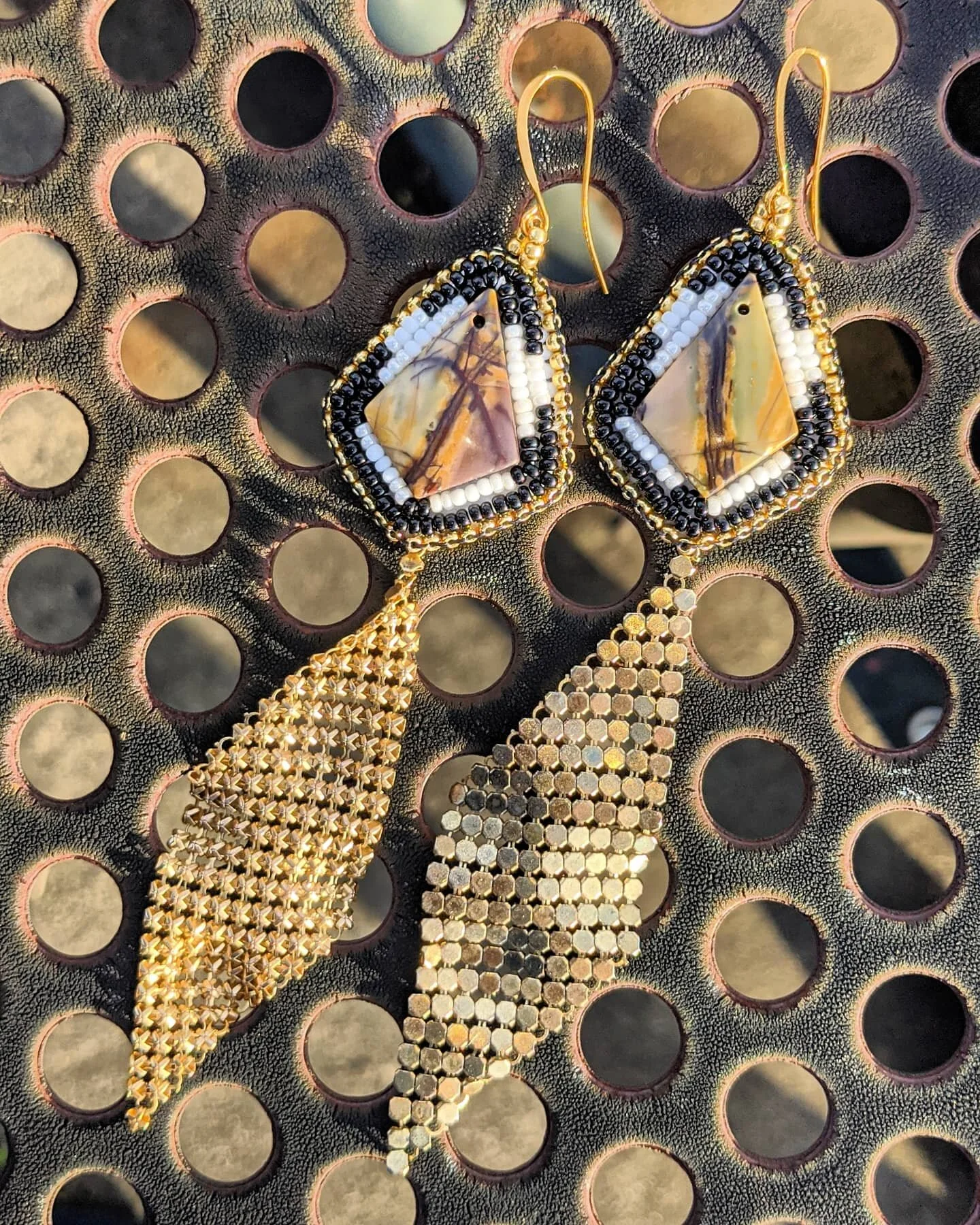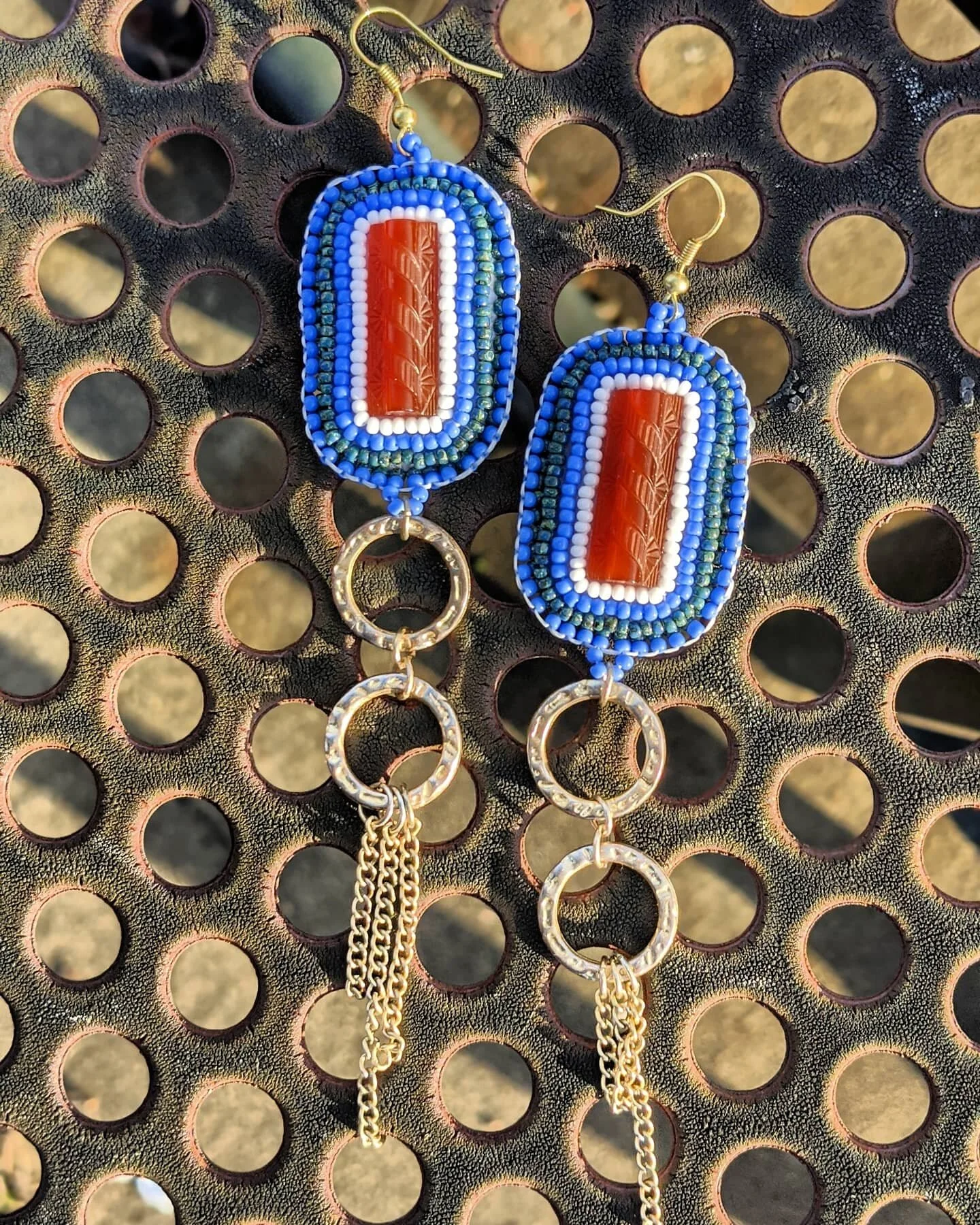How To Love, When Love Seems Impossible
For her, it was an undeniable embrace of art, passion, faith. For him, it was a willingness to be vulnerable.
Like the beads she threads together, Sarah, a.k.a. @MelancholyNow persisted one day, and then the next despite incredible odds. She is Potawatomi and the numbers haven’t been stacked in her favor.
Indigenous peoples of the U.S. are a mere 1.6% of the population of their homeland; the poverty rates, unemployment, and police brutality rates are higher than any other ethnic group; and 84% of the women experience violence, most often from non-natives. Being alive is a miracle in and of itself.
He lived one day and then the next as well, his life somewhat more humdrum before he met her (he was a tech for a pest control company) yet the challenges were no less. George a.k.a. @thedevilishgrin000 is Pamunkey and Black, his father died when he was 8 months old.
Love for him wasn’t something tangible to say the least.
Yet somehow, they did meet. Call it divine intervention, a plan written by the ancestors, or the sheer willpower of love -- they met, fell for each other, learned each other, and welcomed a new baby into a world riddled with protests and wildfires and good old-fashioned drama.
They sat with UWM to guide us through the laughter, tears, reflection that is mission “impossible”: Valentine’s Day edition.
“Unconditional love is easy to understand, hard in practice.”
UWM: How do you define love?
HER: Bozho, Nin se Wapshkankwet mine Sarah ndeshnekas. Hello, I'm Wapshkanket but I'm called Sarah.
I would define love as an energy, probably the most powerful energy. And I would leave room to say we evidence love all around, daily. We might have trouble identifying it as “love” because it’s spoken in different languages and we don’t all speak the same language.
HIM: Love is Vulnerability. Vulnerability is love.
What did you learn about love from your family?
HER: My family taught me how powerful love can be, what it can overcome, how it can heal, how it can grow and transform, and also how love without boundaries and limits, respect, and humility can cause pain.
HIM: I learned Love is about sacrificing self. I watched my mother raise me and my sister. Which now seems like an impossible task to take on single handedly. I can't imagine her sacrifice, we were not a very huggy family but, I understood love was more than affection.
What did you learn about love from your tribe?
HER: My people, the Potawatomi (I do belong to other communities, but I am an enrolled citizen of the Prairie Band Potawatomi Nation), taught me how love can impact a community and be a shared life event. My people continued to show me how our collective love for our culture, language, homelands, and people can span generations and survives genocide, forced removal (Potawatomi Trail of Death), forced assimilation, and continued occupation.
HIM: Not much. I didn't grow up with my tribe and I recently have been rekindling.
What are you learning about love from your child (congratulations!!!)
HER: Thank you! I’m learning to believe in miracles. Truly. I had so many complications while pregnant. Including reproductive cancers. She teaches me how healing love can be, even in the face of great loss (my mother’s unexpected and sudden death). She reminds me daily to slow down and enjoy life. She teaches me the importance of perspective and reminds me how precious love is.
HIM: Thank you so much! I'm learning that love has so many more layers. It has so much to do with emotion as well as strength and patience, it requires your entire being.
Unconditional love is easy to understand, hard in practice. This was my first child so I was very anxious/nervous, it was hard to stop sometimes and be really appreciative. The complexity of love is never ending, always changing, never conforming.
What do you do to practice self-care?
HER: I need to be on the land or water, just outside and moving. We live close to the Atlantic so I try to spend time in the water. I like solitude and really recharge when I’m in full on introvert mode.
I also treasure “adventures” with my family and away from everything and everyone. I do meditate, and pray or practice our “Water Songs.” I also enjoy beadwork, writing poetry, cooking, and organizing (makes it less chaotic feeling, especially with a little one).
HIM: I play drums a lot. Not enough to be great. But I think playing the drums is about communication. Sometimes I feel like I need to communicate something even if no one is listening or I need to say something. It really helps me equalize.
Drinking tons of water is always great. Sometimes I like to fast, I won't eat sugars or stay low carb for a while, stay away from dairy. Play a video game or so if I get a second.
Also, talks with my partner about everything, things that bother me basically — she's like my in-house therapist.
How did you two meet?
HER: We met at work. I was the office manager and he was the field manager. We just started talking about art one day before things picked up on the job, then hung out, outside of work and collaborated on a couple projects and it progressed from there.
HIM: I was one of the techs for a pest control company. She said she was into art. She connected me with some art projects and we started working closer together. We just had very similar interest.
What is one of your partner's favorite love languages (affirmations, quality time, cooking, gifts...)?
HER: Being respected and reminded that he is valuable through follow through to commitments, and just heard. I’d also say that he needs positive, uplifting affirmations and to be celebrated, or at the very least acknowledged and appreciated.
HIM: Quality Time is major. We both work from home, but you would be surprised about the time that we don't get with each other because of everything that needs to get done. She really makes sure that I get sleep when I'm working late, holding the baby tirelessly. She truly is amazing. It’s hard to keep on her level.
How do you practice forgiveness, when your partner is "wrong"?
HER: I need to improve on this. I need to take some lessons from him on this because it’s a weakness for me. I usually have to take some time and overcome my own negative feelings and negative self-talk and just let my guard down and remember that we are different people, we speak different “love languages,” and we are allowed to make mistakes, to be “wrong” and to have room to grow and be loved.
We also have fair fighting rules that we try to follow, and we’re getting better at using them!
HIM: I really don't care as long as she is able to see why she is wrong. Grudges weigh too much and take so much energy, I would rather not.
How do you practice forgiveness as an Indigenous in America?
HER: Practicing forgiveness in an Anti-Indigenous America, as an indigenous person is so exhausting. Holding on to intergenerational trauma, anger, and grief is just devastating to your mind, body, and spirit.
So I do a lot of grief work, for myself and others. I do a lot of community work and focus on creating togetherness, building safe and inclusive spaces for educating and healing, supporting, and increasing our vibrational frequency (through acts of love).
I’ve done this since I was 19 years old, through Mental Health work (I’m a former QMHP) to Funeral Care and Death work, as well as through non-professional community work like volunteering and being on the ground at certain happenings hosted by the community for the community.
I also do prayer and meditation work with others and with energies.
HIM: I don't manifest hate because it’s toxic and I don't want to pass it to my kids. But yes, it’s very difficult. I think the more changes we make and the more we don't stand for injustice will be the greatest way to forgive. Being a Black Native that is reconnecting, this is the hardest thing for me.
Word. One more question: favorite love song on your playlist right now?
HER: I love Dessa and I've been listening to this song a LOT. Super healing song.
HIM: “Love Sponge,” Buju Banton. This song bangs!!!!
Stay in the loop with Sarah & George at Speaking Silently.
You may custom order jewelry from Sarah (your patience with the amount of time it takes to create each piece is greatly appreciated) via @MelancholyNow; and connect with George for video editing and other custom mixed media designs @thedevilishgrin000 (IG) or @devilishgrin000 (Twitter).












